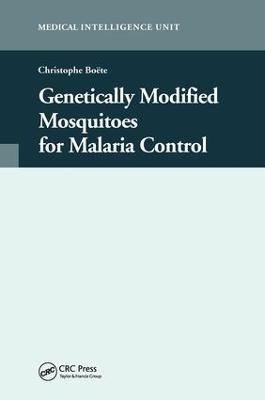
Genetically Modified Mosquitoes for Malaria Control
CRC Press (Verlag)
978-1-58706-096-0 (ISBN)
- Titel nicht im Sortiment
- Artikel merken
Despite a century of research and attempts to control one of the deadliest foes of mankind, the malaria situation remains a major public health problem. Obviously biological explanations (the resistance of parasites and mosquitoes against available drugs and insecticides respectively) are often given, but they remain partial and incomplete. Indeed, the deterioration of socio-economic conditions due to the policies imposed on many developing countries by international financial institutions, such as the structural adjustment programmes and the mechanism of debt, plays an important role in the malaria situation and its evolution.
In the last decade, molecular biology has been a source of great hope for creating genetically-modified mosquitoes able to resist the malaria parasite. If technical progress permits confidence in the creation of such non-vectors, many questions remain open concerning the putative success of their deployment and the resultant reduction of malaria transmission. Indeed the understanding of the coevolutionary processes underlying malaria/mosquito interactions is crucially lacking despite its enormous importance. Moreover, when discussing transgenic mosquitoes, one critical point is the spread of the allele conferring resistance in mosquito populations ensuring the replacement of a or several populations of vectors able to transmit malaria by (theoretically) unable one(s). However, invading a whole population of mosquitoes with a transgene (composed with an allele conferring malaria-resistance and a driving system) is unlikely to be an easy task, it will at least depend on the population structure and on the quality of the driver. Alongside this, it appears that the spread of refractoriness itself is necessary but not sufficient as interactions between the allele of interest, the parasite and the environment may affect refractoriness and thus limit the expected success in terms of malaria control. Indeed the aim of a release of transgenic mosquitoes is not the spread of an allele of interest in mosquito populations but a real decrease in the malaria burden, it seems then crucial to have a look at the possible consequences of such a release. How does a reduction in malaria transmission affect the epidemiology of the disease? What could be the evolutionary consequences in terms of the virulence of the parasite? Thus it appears that the idea of using GM mosquitoes opens up more questions than answers and calls for some rethinking in malaria biology. Finally, if the mainstream perspective concerning the use of transgenic mosquitoes is dealing with spreading refractoriness in wild populations of mosquitoes, little has been done about methods for affecting the mosquito-host interactions whether it be with GM technology or using more conventional methods. However, prior to any release of transgenic insects, numerous ethical, legal and social questions are still pending and the questioning of the interest of such a high-tech method for malaria control and its societal implications seems highly necessary.
Boete/, Christophe
1. Malaria Situation in the Beginning of the 21st Century 2. Malaria and Structural Adjustment: Proof by Contradiction 3. Development of a Toolkit for Manipulating Malaria Vectors 4. Immune System Polymorphism: Implications for Genetic Engineering 5. Predicting the Spread of a Transgene in African Malaria Vector Populations: Current Knowledge and Limitations 6. Advantages and Limitations of Transgenic Vector Control: Sterile Males versus Gene Drivers 7. Malaria-Refractoriness in Mosquito: Just a Matter of Harbouring Genes? 8. The Epidemiological Consequences of Reducing the Transmission Intensity of P. falciparum 9. Malaria Parasite Virulence in Mosquitoes and Its Implications for the Introduction and Efficacy of GMM Malaria Control Programmes 10. Thinking Transgenic Vectors in a Population Context: Some Expectations and Many Open-Questions 11. The Genetics of Vector-Host Interactions: Alternative Strategies for Genetic Engineering for Malaria Control 12. Genetically-Modified Mosquitoes for Malaria Control: Requirements to Be Considered before Field Releases 13. Ethics and Community Engagement for GM Insect Vector Release 14. Transgenic Mosquitoes for Malaria Control: Time to Spread Out of the Scientific Arena
| Zusatzinfo | 27 Illustrations, black and white |
|---|---|
| Verlagsort | London |
| Sprache | englisch |
| Maße | 152 x 229 mm |
| Gewicht | 476 g |
| Themenwelt | Medizin / Pharmazie ► Allgemeines / Lexika |
| Studium ► Querschnittsbereiche ► Epidemiologie / Med. Biometrie | |
| Studium ► Querschnittsbereiche ► Infektiologie / Immunologie | |
| Naturwissenschaften ► Biologie | |
| ISBN-10 | 1-58706-096-5 / 1587060965 |
| ISBN-13 | 978-1-58706-096-0 / 9781587060960 |
| Zustand | Neuware |
| Informationen gemäß Produktsicherheitsverordnung (GPSR) | |
| Haben Sie eine Frage zum Produkt? |
aus dem Bereich


